#south african products
Explore tagged Tumblr posts
Text
What To Buy in South Africa, Top 10 Famous & Cheap Things To Buy in South Africa
Best Things To Buy in South Africa Are you planning to visit South Africa for a tour? Well, that’s a good idea. There are many famous, unique, affordable, and antique things to buy in South Africa. So, to help you understand, we have listed 10 famous and affordable South African souvenirs: 1. Ostrich Products – South Africa famous things to buy The ostrich is one of the native birds of Africa.…

View On WordPress
0 notes
Photo
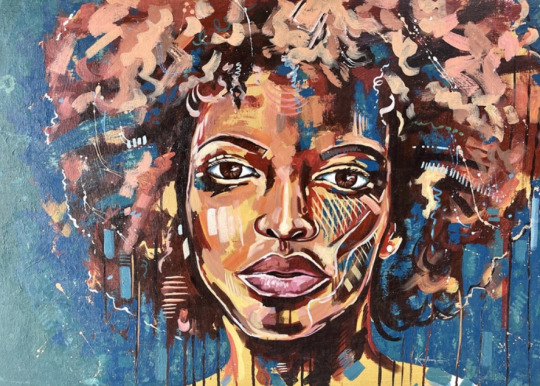
"Birungi African Traditional Art" by Muki Designs
#art#print#fine art#artist#muki designs#tribal#artistic#africa#traditional#colorful art#fantastic art#beautiful art#nigerian art#south african art#art lovers#real art#mukidesigns#african style art#art products
270 notes
·
View notes
Text

How To Start A Production Company And Start Making Movies - Tendayi Nyeke [FULL INTERVIEW]
Watch the video interview on YouTube here.
#netflix#filmmaking#filmmakers#zimbabwe#africa#african cinema#south africa#film and tv#moving to la#hollywood#film industry#animation#working in film#working in hollywood#film production#production company#webseries#african stories#independent film#film#screenwriting#writers on tumblr#screenwriters on tumblr#filmmakers on tumblr
3 notes
·
View notes
Text
never trust amazon product reviews youll think its fine but then theyll have you buying a dvd made for south american dvd players despite the website knowing damn well you live in the united states
#og post#batposting#this is entirely on me for not reading the product description footnotes but im still bitter. what i do with this dvd now#do any south american mutuals want this batman cartoon and feel comfortable giving me their mailing address#edit: actually its not south american its european and african and japanese. region 2. sorry past me was mad when typing this
20 notes
·
View notes
Text
i want u guys to know that with every new opla cast member announced if someone happens to be played by a south african i am doing a little cheer and heel click no matter how small the role is
#ITS JUST SO. EXCITING. TO ME!!!!#god i really wish i could find that one opla post i made specifically talking abt#how exciting it was seeing so many south africans involved in such a big and widely viewed production#but idk how :(
0 notes
Text
What to boycott NOW to help stop Israel’s unfolding genocide of Palestinians in Gaza
Reminder that boycotting DOES work, there is historic proof! Don't let anyone discourage you otherwise!
The BDS movement uses the historically successful method of targeted boycotts inspired by the South African anti-apartheid movement, the US Civil Rights movement, the Indian anti-colonial struggle, among others worldwide.
We must strategically focus on a relatively smaller number of carefully selected companies and products for maximum impact. Companies that play a clear and direct role in Israel’s crimes and where there is real potential for winning, as was the case with, among others, G4S, Veolia, Orange, Ben & Jerry’s and Pillsbury. Compelling such huge, complicit companies, through strategic and context-sensitive boycott and divestment campaigns, to end their complicity in Israeli apartheid and war crimes against Palestinians sends a very powerful message to hundreds of other complicit companies that “your time will come, so get out before it’s too late!”
68K notes
·
View notes
Text
Topic & A7S - Out My Head (Official Video)
Makeup and Hair: Sian Bianca Moss
#music video makeup artist#makeup artist cape town#makeup artist south africa#cape town makeup artist#south african makeup artist#commercial makeup artist#makeup and hair styling#makeup artist#hairstylist#grooming#production makeup artist
0 notes
Text
Safety First: How to Select the Ideal Security System for Your Small Business

Cyber Legend Technologies not only specializes in top-notch security solutions but also serves as a leading IT product supplier in Africa ,also across Uae and the Middle East, ensuring your business has access to the best technology available.
If you are interested to know more please check out our blog
Contact us today for more information! 📞 For Enquiry: +971 4 338 3178
#cyberlegend technologies#united arab emirates#it products suppliers in dubai#south africa#African products#cyber legend technologies#access control systems in dubai
0 notes
Text
Why Environmental Responsibility is Essential in the Petroleum Industry: Neo Blu’s Vision
The petroleum industry has long been a cornerstone of global energy production, powering economies and enabling modern life. However, with growing concerns over climate change, environmental degradation, and resource depletion, the industry faces increasing pressure to adopt sustainable practices. For companies like Neo Blu Energy, environmental responsibility is not only essential but a key part of their corporate vision. This blog will explore why sustainability is vital in the petroleum industry and how Neo Blu Energy is leading the charge toward a greener future.
The Growing Need for Environmental Responsibility in the Petroleum Industry The petroleum industry is one of the largest contributors to greenhouse gas emissions and environmental degradation. With increasing awareness of the global climate crisis, companies in this sector must acknowledge their role in shaping a more sustainable future. Here’s why environmental responsibility is no longer optional:
Climate Change and Global Warming: The combustion of fossil fuels contributes significantly to global carbon emissions, leading to rising temperatures, melting ice caps, and extreme weather conditions. The petroleum industry, as a major player, has a responsibility to reduce emissions and adopt cleaner technologies.
Environmental Degradation: Oil spills, land disruption, and pollution from extraction processes have long-term detrimental effects on ecosystems. Responsible companies must ensure that their operations do not harm wildlife, oceans, or communities.
Resource Depletion: Fossil fuels are finite resources. Environmental responsibility requires forward-thinking companies to explore renewable energy alternatives and invest in technologies that reduce their dependence on non-renewable resources.
Government Regulations: Many countries are introducing strict environmental regulations. Companies that fail to comply face significant penalties and damage to their reputation. Adopting eco-friendly practices helps businesses stay ahead of regulatory requirements.
Neo Blu Energy’s Vision for a Sustainable Future At Neo Blu Energy, we recognize the critical importance of environmental responsibility. We understand that as a petroleum wholesaler, we are uniquely positioned to influence the industry’s shift towards sustainability. Our vision is rooted in the following core principles:
Reducing Our Carbon Footprint: Neo Blu Energy is committed to minimizing the carbon footprint of our operations. We constantly seek innovative solutions that reduce emissions, such as upgrading our fuel distribution methods and using cleaner transportation options for bulk fuel logistics.
Investing in Renewable Energy: While petroleum remains a key resource, Neo Blu Energy is actively exploring and investing in renewable energy sources. By diversifying our energy portfolio, we aim to contribute to a more sustainable and balanced energy market.
Sustainable Fuel Solutions: We are working on providing cleaner fuel alternatives that meet strict environmental standards. Our efforts include partnering with eco-friendly fuel suppliers and researching biofuels that reduce greenhouse gas emissions.
Eco-Friendly Operations: From fuel storage to distribution, Neo Blu Energy follows environmentally friendly practices at every stage of the supply chain. Our corporate governance is built on strict environmental policies to ensure sustainable operations.
Corporate Social Responsibility: Beyond our internal efforts, Neo Blu Energy is committed to contributing to broader environmental causes. Through partnerships with local and international organizations, we are actively involved in reforestation projects, ocean conservation initiatives, and educational programs that raise awareness about environmental issues.

Why Neo Blu Energy Leads the Way in Petroleum Industry Sustainability Neo Blu Energy is more than just a petroleum wholesaler; we are a leader in adopting and promoting sustainable practices in the industry. Here’s how we’re making a difference:
Innovation and Technology: We leverage cutting-edge technologies to reduce the environmental impact of our operations. From using advanced filtration systems to adopting digital platforms that track emissions, we ensure that our processes are as eco-friendly as possible.
Employee and Community Engagement: Environmental responsibility starts with awareness. Neo Blu Energy actively involves its employees and the communities we serve in environmental initiatives, creating a culture of sustainability that extends beyond our business.
Collaboration with Environmental Groups: We collaborate with environmental organizations to develop new ways to reduce our impact. These partnerships allow us to stay informed on the latest sustainability trends and practices, ensuring that we remain at the forefront of the industry.
Long-Term Vision: Our commitment to sustainability isn’t just about short-term solutions. Neo Blu Energy has developed a long-term strategy that includes goals such as transitioning to lower-emission fuels, reducing water usage in operations, and continuing to invest in renewable energy.
Frequently Asked Questions (FAQs) Q1. How does Neo Blu Energy reduce its environmental impact while being a petroleum wholesaler? A: Neo Blu Energy takes several measures to reduce its environmental impact, such as minimizing emissions in transportation, investing in cleaner fuel alternatives, and adopting eco-friendly practices throughout our supply chain. We also partner with renewable energy companies to promote a balanced energy mix.
Q2. What role does renewable energy play in Neo Blu Energy’s sustainability strategy? A: Although our core business focuses on petroleum, we believe renewable energy is essential for the future. We are actively exploring ways to integrate renewable energy sources into our business and are committed to supporting the global transition to cleaner energy.
Q3. How does Neo Blu Energy ensure compliance with environmental regulations? A: We are fully compliant with local and international environmental regulations. Neo Blu Energy’s corporate governance framework ensures that we regularly audit our processes, adopt best practices, and stay updated with any regulatory changes.
Q4. How can petroleum companies be environmentally responsible? A: Petroleum companies can adopt cleaner technologies, reduce emissions, invest in renewable energy, and follow sustainable operational practices. Companies must also engage in environmental conservation efforts and prioritize reducing their carbon footprint.
Q5. Why is environmental responsibility critical in the petroleum industry? A: The petroleum industry significantly contributes to global carbon emissions and environmental degradation. Being environmentally responsible not only mitigates these impacts but also helps companies meet regulatory requirements, improve their reputation, and ensure long-term business sustainability.
Conclusion Environmental responsibility is no longer an option for companies in the petroleum industry—it’s a necessity. At Neo Blu Energy, we are committed to driving positive change in the sector by adopting sustainable practices, reducing our carbon footprint, and investing in renewable energy. As the world moves toward a greener future, we believe that the petroleum industry can—and must—play a key role in shaping that future responsibly.
By prioritizing environmental sustainability, Neo Blu Energy is not only contributing to a healthier planet but also setting the standard for what it means to be a responsible player in the energy industry.
#Petroleum Products in South Africa#Petroleum Wholesaler in South Africa#Fuel Distribution Services in South Africa#Bulk Petroleum Supply in South Africa#Wholesale Fuel Supply in South Africa#Petroleum Distribution Services in South Africa#Oil and Gas Wholesale in South Africa#Energy Distribution Services in South Africa#Industrial Fuel Supply in South Africa#Fuel Logistics in South Africa#Petroleum Partnerships in South Africa#Fuel Supply Management in South Africa#Oil Products Distributor in South Africa#Petroleum Industry Suppliers in South Africa#Wholesale Petroleum Distributor in South Africa#Petroleum Product Suppliers in South Africa#Industrial Fuel Distribution in South Africa#Bulk Fuel Suppliers in South Africa#Petroleum Industry in South Africa#South African Petroleum Wholesaler in South Africa#Diesel supplier in South Africa#A1 Jet Fuel in South Africa#HFO Supplier in South Africa#Fuel management in South Africa#Fuel Supplier in South Africa#Neo Blu in South Africa#Neo Blu Energy in South Africa#NBE in South Africa
0 notes
Text
sure baby queen may be an industry plant but ill be damned if quarter life crisis doesnt fucking slap
#they speak#is she an industry plant idk#but shes a white south african who moved to london at 18#and has got quality music n video production before even putting her first album out so like idkkkkk yall tell me#it slaps tho ngl n the acoustic session last week was a banger
0 notes
Photo

"Purple Charm African Traditional Art" by Muki Designs
#art#print#fine art#artist#muki designs#tribal#artistic#africa#traditional#colorful art#fantastic art#beautiful art#nigerian art#south african art#art lovers#real art#mukidesigns#african style art#art products
328 notes
·
View notes
Text
𝗧𝗛𝗘 𝟭𝟵𝟬𝗧𝗛 𝗦𝗔 𝗗𝗔𝗜𝗥𝗬 𝗖𝗛𝗔𝗠𝗣𝗜𝗢𝗡𝗦𝗛𝗜𝗣𝗦
The who’s who of dairy specialists in the country recently convened in Durbanville for the judging of the 190th edition of the biggest and oldest dairy competition in Africa, the South African Dairy Championships.
MORE THAN 900 PRODUCTS COMPETE IN THE 190TH SA DAIRY CHAMPIONSHIPS Chief Judge Alan Fourie and Breyton Milford, General Manager of Agri-Expo, at the judging of the 190th SA Dairy Championships, hosted by Agri-Expo at Eensgezind The who’s who of dairy specialists in the country recently convened in Durbanville for the judging of the 190th edition of the biggest and oldest dairy competition in…

View On WordPress
#190th anniversary#Agri-Expo#Agriculture#Cape Town#Dairy#Foodie#International Judge#Product of the Year#Qualité#Sa Cheese Festival#SA Dairy Championships#South Africa#South African Dairy Championships#Western Cape
0 notes
Text
Ask an older generation of white South Africans when they first felt the bite of anti-apartheid sanctions, and some point to the moment in 1968 when their prime minister, BJ Vorster, banned a tour by the England cricket team because it included a mixed-race player, Basil D’Oliveira. After that, South Africa was excluded from international cricket until Nelson Mandela walked free from prison 22 years later. The D’Oliveira affair, as it became known, proved a watershed in drumming up popular support for the sporting boycott that eventually saw the country excluded from most international competition including rugby, the great passion of the white Afrikaners who were the base of the ruling Nationalist party and who bitterly resented being cast out. For others, the moment of reckoning came years later, in 1985 when foreign banks called in South Africa’s loans. It was a clear sign that the country’s economy was going to pay an ever higher price for apartheid. Neither of those events was decisive in bringing down South Africa’s regime. Far more credit lies with the black schoolchildren who took to the streets of Soweto in 1976 and kicked off years of unrest and civil disobedience that made the country increasingly ungovernable until changing global politics, and the collapse of communism, played its part. But the rise of the popular anti-apartheid boycott over nearly 30 years made its mark on South Africans who were increasingly confronted by a repudiation of their system. Ordinary Europeans pressured supermarkets to stop selling South African products. British students forced Barclays Bank to pull out of the apartheid state. The refusal of a Dublin shop worker to ring up a Cape grapefruit led to a strike and then a total ban on South African imports by the Irish government. By the mid-1980s, one in four Britons said they were boycotting South African goods – a testament to the reach of the anti-apartheid campaign. . . . The musicians union blocked South African artists from playing on the BBC, and the cultural boycott saw most performers refusing to play in the apartheid state, although some, including Elton John and Queen, infamously put on concerts at Sun City in the Bophuthatswana homeland. The US didn’t have the same sporting or cultural ties, and imported far fewer South African products, but the mobilisation against apartheid in universities, churches and through local coalitions in the 1980s was instrumental in forcing the hand of American politicians and big business in favour of financial sanctions and divestment. By the time President FW de Klerk was ready to release Mandela and negotiate an end to apartheid, a big selling point for part of the white population was an end to boycotts and isolation. Twenty-seven years after the end of white rule, some see the boycott campaign against South Africa as a guide to mobilising popular support against what is increasingly condemned as Israel’s own brand of apartheid.
. . . continues at the guardian (21 May, 2021)
#israel#palestine#gaza#south africa#i think all of us need to seriously study the history and actions of the anti-apartheid movement#and apply these lessons to the israeli occupation
3K notes
·
View notes
Text
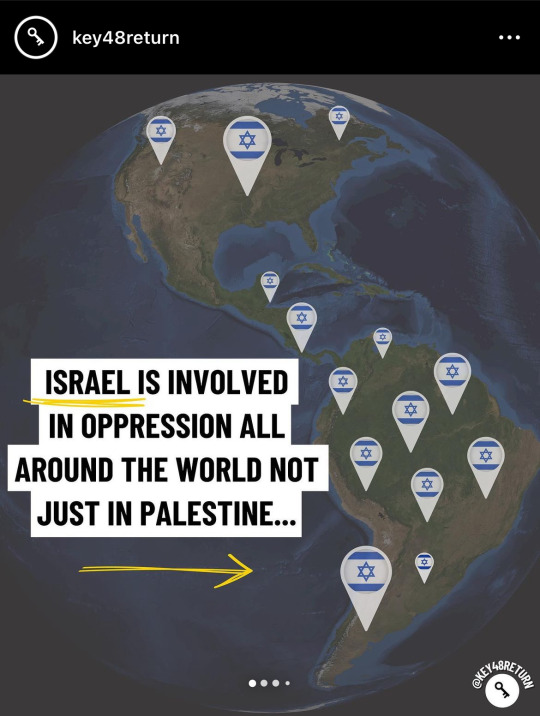
ID 1: Screenshot of a post by @/key48return on Instagram. Background is of a globe with pinpoints of the israeli flag all over North and South America. Title reads in all caps, “israel is involved in oppression all over the world not just in Palestine…” A yellow arrow points right underneath the title. End ID
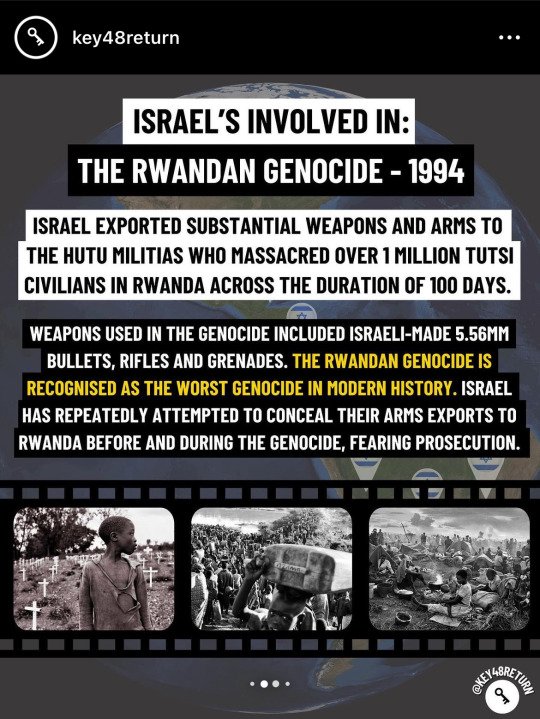
ID 2: In all caps, “ISRAEL'S INVOLVED IN:
THE RWANDAN GENOCIDE - 1994
ISRAEL EXPORTED SUBSTANTIAL WEAPONS AND ARMS TO THE HUTU MILITIAS WHO MASSACRED OVER 1 MILLION TUTSI CIVILIANS IN RWANDA ACROSS THE DURATION OF 100 DAYS.
WEAPONS USED IN THE GENOCIDE INCLUDED ISRAELI-MADE 5.56MM BULLETS, RIFLES AND GRENADES. THE RWANDAN GENOCIDE IS RECOGNISED AS THE WORST GENOCIDE IN MODERN HISTORY. ISRAEL HAS REPEATEDLY ATTEMPTED TO CONCEAL THEIR ARMS EXPORTS TO RWANDA BEFORE AND DURING THE GENOCIDE, FEARING PROSECUTION.”
Black and white photos below are shown of various Rwandan children in graveyards or in makeshift tents just trying to get by. End ID.
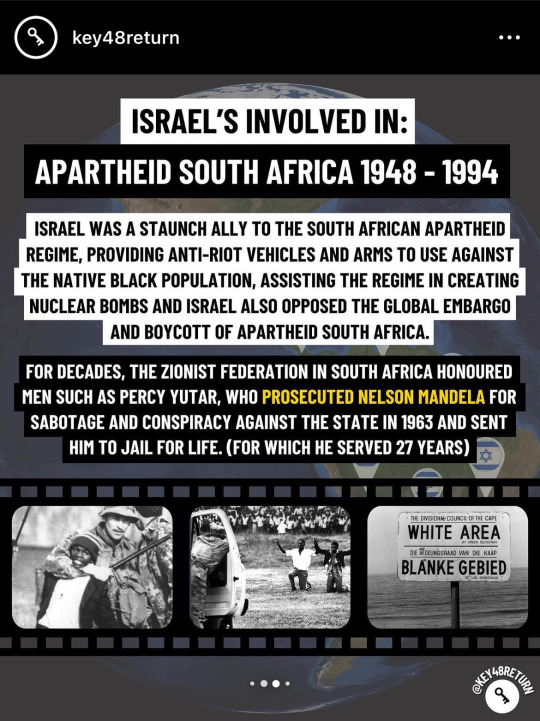
ID 3: In all caps, “ISRAEL'S INVOLVED IN:
APARTHEID SOUTH AFRICA 1948 - 1994
ISRAEL WAS A STAUNCH ALLY TO THE SOUTH AFRICAN APARTHEID REGIME, PROVIDING ANTI-RIOT VEHICLES AND ARMS TO USE AGAINST THE NATIVE BLACK POPULATION, ASSISTING THE REGIME IN CREATING NUCLEAR BOMBS AND ISRAEL ALSO OPPOSED THE GLOBAL EMBARGO AND BOYCOTT OF APARTHEID SOUTH AFRICA.
FOR DECADES, THE ZIONIST FEDERATION IN SOUTH AFRICA HONOURED MEN SUCH AS PERCY YUTAR, WHO PROSECUTED NELSON MANDELA FOR SABOTAGE AND CONSPIRACY AGAINST THE STATE IN 1963 AND SENT HIM TO JAIL FOR LIFE. (FOR WHICH HE SERVED 27 YEARS)”
Black and white photos below showcase a Black man being held in a chokehold by a white man, two Black people on their knees and hands up trying not to get shot, and a sign that reads in english and afrikaans “white area.” End ID.
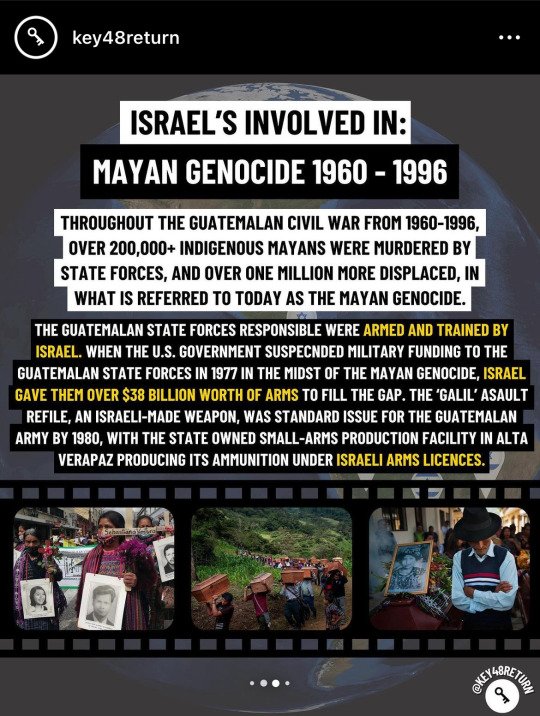
ID 4: In all caps, “ISRAEL'S INVOLVED IN:
MAYAN GENOCIDE 1960 - 1996
THROUGHOUT THE GUATEMALAN CIVIL WAR FROM 1960-1996, OVER 200,000+ INDIGENOUS MAYANS WERE MURDERED BY STATE FORCES, AND OVER ONE MILLION MORE DISPLACED, IN WHAT IS REFERRED TO TODAY AS THE MAYAN GENOCIDE.
THE GUATEMALAN STATE FORCES RESPONSIBLE WERE ARMED AND TRAINED BY ISRAEL. WHEN THE U.S. GOVERNMENT SUSPENDED MILITARY FUNDING TO THE GUATEMALAN STATE FORCES IN 1977 IN THE MIDST OF THE MAYAN GENOCIDE, ISRAEL GAVE THEM OVER $38 BILLION WORTH OF ARMS TO FILL THE GAP. THE 'GALIL' ASAULT RIFLE, AN ISRAELI-MADE WEAPON, WAS STANDARD ISSUE FOR THE GUATEMALAN ARMY BY 1980, WITH THE STATE OWNED SMALL-ARMS PRODUCTION FACILITY IN ALTA VERAPAZ PRODUCING ITS AMMUNITION UNDER ISRAELI ARMS LICENCES.”
Below are multiple in-color photos of Mayan families mourning, one photo in particular which shows indigenous Mayans carrying a seemingly endless line of coffins off into the distance. End ID.
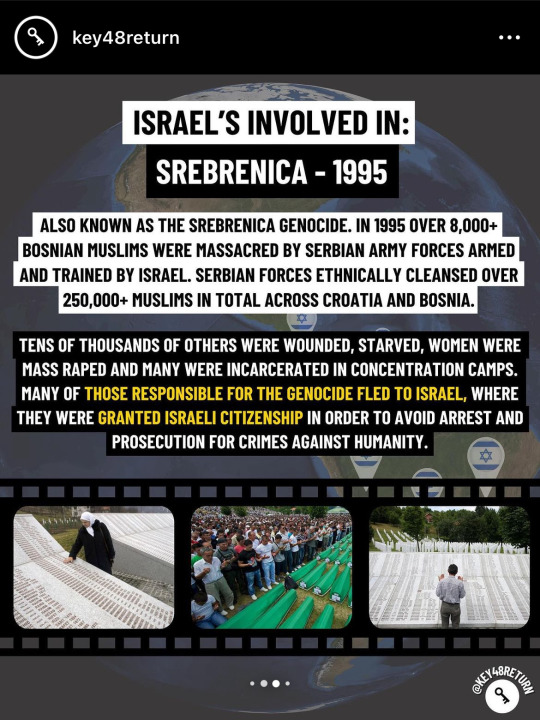
ID 5: In all caps, “ISRAEL'S INVOLVED IN:
SREBRENICA - 1995
ALSO KNOWN AS THE SREBRENICA GENOCIDE. IN 1995 OVER 8,000+ BOSNIAN MUSLIMS WERE MASSACRED BY SERBIAN ARMY FORCES ARMED AND TRAINED BY ISRAEL. SERBIAN FORCES ETHNICALLY CLEANSED OVER 250,000+ MUSLIMS IN TOTAL ACROSS CROATIA AND BOSNIA.
TENS OF THOUSANDS OF OTHERS WERE WOUNDED, STARVED, WOMEN WERE MASS RAPED AND MANY WERE INCARCERATED IN CONCENTRATION CAMPS. MANY OF THOSE RESPONSIBLE FOR THE GENOCIDE FLED TO ISRAEL, WHERE THEY WERE GRANTED ISRAELI CITIZENSHIP IN ORDER TO AVOID ARREST AND PROSECUTION FOR CRIMES AGAINST HUMANITY.”
Once again, the in-color photos below show various peoples mourning. Two of the photos specifically show people reaching their hands out over extremely long lists of just names of people who have died. End ID.

ID 6: In all caps, “ISRAEL'S INVOLVED IN:
TRAINING U.S. POLICE
SINCE 1990, HUNDREDS OF AMERICAN POLICE OFFICERS, INCLUDING AGENTS FROM THE FBI, CIA AND IMMIGRATION AND CUSTOMS ENFORCEMENT (ICE), HAVE EITHER BEEN SENT TO ISRAEL THROUGH POLICE TRAINING EXCHANGES, OR ATTENDED SUMMITS WITHIN THE U.S. THAT WERE SPONSORED BY ISRAELI LOBBY ORGANISATIONS.
THE KNEE-TO-NECK 'RESTRAINT' THAT DEREK CHAUVIN MURDERED GEORGE FLOYD WITH, IS OFTEN USED BY ISRAELI POLICE AND SOLIDERS AGAINST PALESTINIANS.
BLACK LIVES MATTER.”
Photos below are in-color and show various B.L.M. protests. End ID.
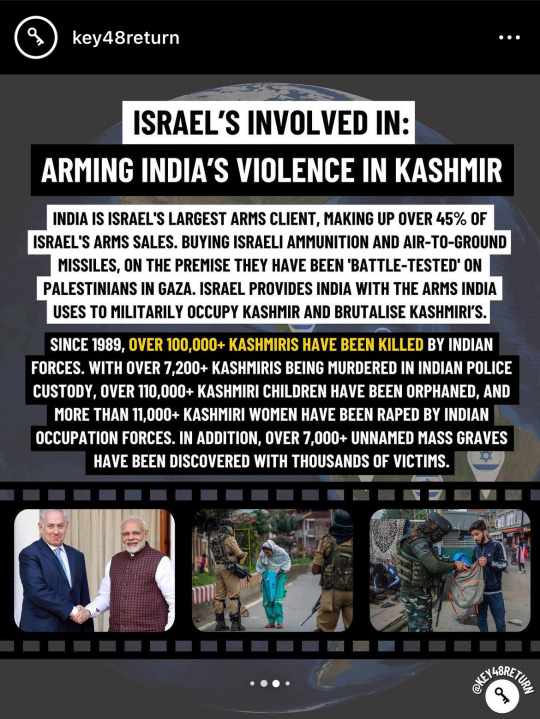
ID 7: In all caps, “ISRAEL'S INVOLVED IN:
ARMING INDIA'S VIOLENCE IN KASHMIR
INDIA IS ISRAEL'S LARGEST ARMS CLIENT, MAKING UP OVER 45% OF ISRAEL'S ARMS SALES. BUYING ISRAELI AMMUNITION AND AIR-TO-GROUND MISSILES, ON THE PREMISE THEY HAVE BEEN 'BATTLE-TESTED' ON PALESTINIANS IN GAZA. ISRAEL PROVIDES INDIA WITH THE ARMS INDIA USES TO MILITARILY OCCUPY KASHMIR AND BRUTALISE KASHMIRI'S.
SINCE 1989, OVER 100,000+ KASHMIRIS HAVE BEEN KILLED BY INDIAN FORCES. WITH OVER 7,200+ KASHMIRIS BEING MURDERED IN INDIAN POLICE CUSTODY, OVER 110,000+ KASHMIRI CHILDREN HAVE BEEN ORPHANED, AND MORE THAN 11,000+ KASHMIRI WOMEN HAVE BEEN RAPED BY INDIAN OCCUPATION FORCES. IN ADDITION, OVER 7,000+ UNNAMED MASS GRAVES HAVE BEEN DISCOVERED WITH THOUSANDS OF VICTIMS.”
The photos below show israel and india’s leaders shaking hands and various armed indian soldiers stopping Kashmiris for unnecessary checks. End ID.
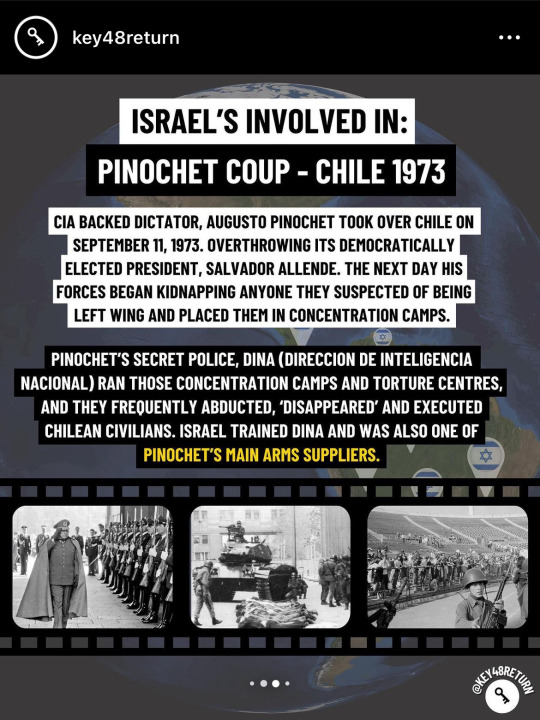
ID 8: In all caps, “ISRAEL'S INVOLVED IN:
PINOCHET COUP - CHILE 1973
CIA BACKED DICTATOR, AUGUSTO PINOCHET TOOK OVER CHILE ON SEPTEMBER 11, 1973. OVERTHROWING ITS DEMOCRATICALLY ELECTED PRESIDENT, SALVADOR ALLENDE. THE NEXT DAY HIS FORCES BEGAN KIDNAPPING ANYONE THEY SUSPECTED OF BEING LEFT WING AND PLACED THEM IN CONCENTRATION CAMPS.
PINOCHET'S SECRET POLICE, DINA (DIRECCION DE INTELIGENCIA NACIONAL) RAN THOSE CONCENTRATION CAMPS AND TORTURE CENTRES, AND THEY FREQUENTLY ABDUCTED, 'DISAPPEARED' AND EXECUTED CHILEAN CIVILIANS. ISRAEL TRAINED DINA AND WAS ALSO ONE OF PINOCHET'S MAIN ARMS SUPPLIERS.”
Black and white photos below showcase various scenes of armed DINA officers, with one photo in particular showing them in a tank over bodies on the ground, presumably dead. End ID.
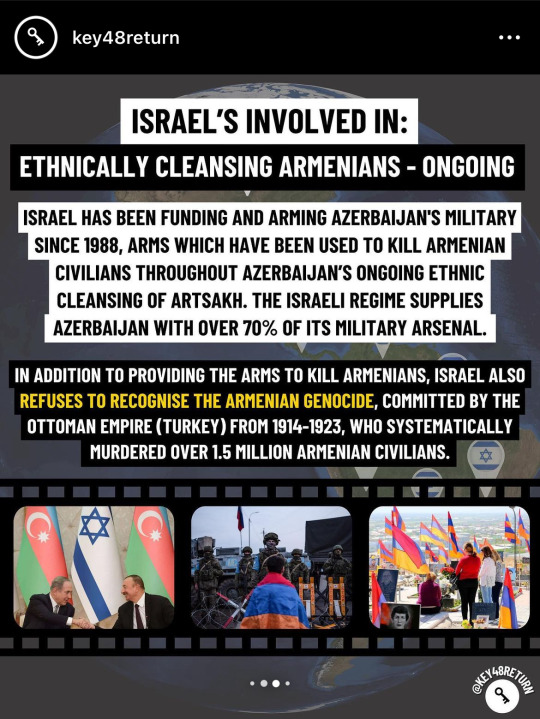
ID 9: In all caps, “ISRAEL'S INVOLVED IN:
ETHNICALLY CLEANSING ARMENIANS - ONGOING
ISRAEL HAS BEEN FUNDING AND ARMING AZERBAIJAN'S MILITARY SINCE 1988, ARMS WHICH HAVE BEEN USED TO KILL ARMENIAN CIVILIANS THROUGHOUT AZERBAIJAN'S ONGOING ETHNIC CLEANSING OF ARTSAKH. THE ISRAELI REGIME SUPPLIES AZERBAIJAN WITH OVER 70% OF ITS MILITARY ARSENAL.
IN ADDITION TO PROVIDING THE ARMS TO KILL ARMENIANS, ISRAEL ALSO REFUSES TO RECOGNISE THE ARMENIAN GENOCIDE, COMMITTED BY THE OTTOMAN EMPIRE (TURKEY) FROM 1914-1923, WHO SYSTEMATICALLY MURDERED OVER 1.5 MILLION ARMENIAN CIVILIANS.”
Photos below show israel and azerbaijan’s leaders shaking hands, azerbaijan’s soldiers menacingly standing in front of someone wrapped in an Armenian flag, and Armenians mourning over a shrine with their flags all around them. End ID.

ID 10: In all caps, “THE PALESTINIAN STRUGGLE FOR FREEDOM IS CONNECTED TO STRUGGLES ALL AROUND THE WORLD.
BECAUSE OPPRESSORS LIKE ISRAEL ARE NOT ONLY UPHOLDING OPPRESSION AGAINST ONE POPULATION, ITS ALWAYS INTERCONNECTED TO OPPRESSING MANY MORE.
FREE PALESTINE.” No photos at the bottom of this slide. End ID.
#reaux speaks#oppression#genocide#ethnic cleansing#apartheid#israel#palestine#free palestine#black lives matter#history#rwanda#africa#south africa#nelson mandela#mayans#guatemala#srebrenica#muslim#police brutality#kashmir#india#narendra modi#benjamin netanyahu#augusto pinochet#chile#armenia#artsakh#azerbaijan#bosnia#serbia
3K notes
·
View notes
Text


‘Children Of Blood And Bone’ Film Adaptation Sets Principal Cast And Release Date
Gina Prince-Bythewood‘s movie adaptation of Children of Blood and Bone has found its principle cast in Thuso Mbedu as Zelie, Amandla Stenberg as Amari, Damson Idris as Inan and Tosin Cole as Tzain.
Also confirmed are Viola Davis as Mama Agba; Cynthia Erivo as Admiral Kaea; Idris Elba as Lekan; Lashana Lynch as Jumoke; and Chiwetel Ejiofor as King Saran.
In negotiations are Regina King as Queen Nehanda; Diaana Babnicova as Folake; and Bukky Bakray as Binta.
The film is based on the bestselling novel of the same name by Tomi Adeyemi. The story is set in an African fantasy kingdom in which a young woman goes on a quest to reclaim the magic that was violently stolen from her people. She and her brother ally with the daughter and son of the king to fight back against his brutal rule.
The movie releases January 15, 2027 in IMAX. Production is set to begin filming in South Africa in the coming weeks. [x]
#Children Of Blood And Bone#Gina Prince-Bythewood#Thuso Mbedu#Viola Davis#Idris Elba#Lashana Lynch#Cynthia Erivo#Amandla Stenberg#Damson Idris#Tosin Cole#what a stellar cast! wow!!
287 notes
·
View notes
Text
African poverty is partly a consequence of energy poverty. In every other continent the vast majority of people have access to electricity. In Africa 600m people, 43% of the total, cannot readily light their homes or charge their phones. And those who nominally have grid electricity find it as reliable as a Scottish summer. More than three-quarters of African firms experience outages; two-fifths say electricity is the main constraint on their business.
If other sub-Saharan African countries had enjoyed power as reliable as South Africa’s from 1995 to 2007, then the continent’s rate of real GDP growth per person would have been two percentage points higher, more than doubling the actual rate, according to one academic paper. Since then South Africa has also had erratic electricity. So-called “load-shedding” is probably the main reason why the economy has shrunk in four of the past eight quarters.
Solar power is increasingly seen as the solution. Last year Africa installed a record amount of photovoltaic (PV) capacity (though this still made up just 1% of the total added worldwide), notes the African Solar Industry Association (AFSIA), a trade group. Globally most solar PV is built by utilities, but in Africa 65% of new capacity over the past two years has come from large firms contracting directly with developers. These deals are part of a decentralised revolution that could be of huge benefit to African economies.
Ground zero for the revolution is South Africa. Last year saw a record number of blackouts imposed by Eskom, the state-run utility, whose dysfunctional coal-fired power stations regularly break down or operate at far below capacity. Fortunately, as load-shedding was peaking, the costs of solar systems were plummeting.
Between 2019 and 2023 the cost of panels fell by 15%, having already declined by almost 90% in the 2010s. Meanwhile battery storage systems now cost about half as much as five years ago. Industrial users pay 20-40% less per unit when buying electricity from private project developers than on the cheapest Eskom tariff.
In the past two calendar years the amount of solar capacity in South Africa rose from 2.8GW to 7.8GW, notes AFSIA, excluding that installed on the roofs of suburban homes. All together South Africa’s solar capacity could now be almost a fifth of that of Eskom’s coal-fired power stations (albeit those still have a higher “capacity factor”, or ability to produce electricity around the clock). The growth of solar is a key reason why there has been less load-shedding in 2024...
Over the past decade the number of startups providing “distributed renewable energy” (DRE) has grown at a clip. Industry estimates suggest that more than 400m Africans get electricity from solar home systems and that more than ten times as many “mini-grids”, most of which use solar, were built in 2016-20 than in the preceding five years. In Kenya DRE firms employ more than six times as many people as the largest utility. In Nigeria they have created almost as many jobs as the oil and gas industry.
“The future is an extremely distributed system to an extent that people haven’t fully grasped,” argues Matthew Tilleard of CrossBoundary Group, a firm whose customers range from large businesses to hitherto unconnected consumers. “It’s going to happen here in Africa first and most consequentially.”
Ignite, which operates in nine African countries, has products that include a basic panel that powers three light bulbs and a phone charger, as well as solar-powered irrigation pumps, stoves and internet routers, and industrial systems. Customers use mobile money to “unlock” a pay-as-you-go meter.
Yariv Cohen, Ignite’s CEO, reckons that the typical $3 per month spent by consumers is less than what they previously paid for kerosene and at phone-charging kiosks. He describes how farmers are more productive because they do not have to get home before dark and children are getting better test scores because they study under bulbs. One family in Rwanda used to keep their two cows in their house because they feared rustlers might come in the dark; now the cattle snooze al fresco under an outside lamp and the family gets more sleep.
...That is one eye-catching aspect of Africa’s solar revolution. But most of the continent is undergoing a more subtle—and significant—experiment in decentralised, commercially driven solar power. It is a trend that could both transform African economies and offer lessons to the rest of the world."
-via The Economist, June 18, 2024. Paragraph breaks added.
#one of the biggest stories of this century is going to be the story of the African Renaissance#I promise you#well preferably they'll come up with a non-European term for it lol#but trust me it WILL happen and it will be SO good to see#africa#south africa#nigeria#kenya#solar#solar power#solar panels#solar pv#energy#clean energy#poverty#electrification#distributed energy#electricity#infrastructure#hope#solarpunk#good news#solar age#<- making that a tag now
416 notes
·
View notes